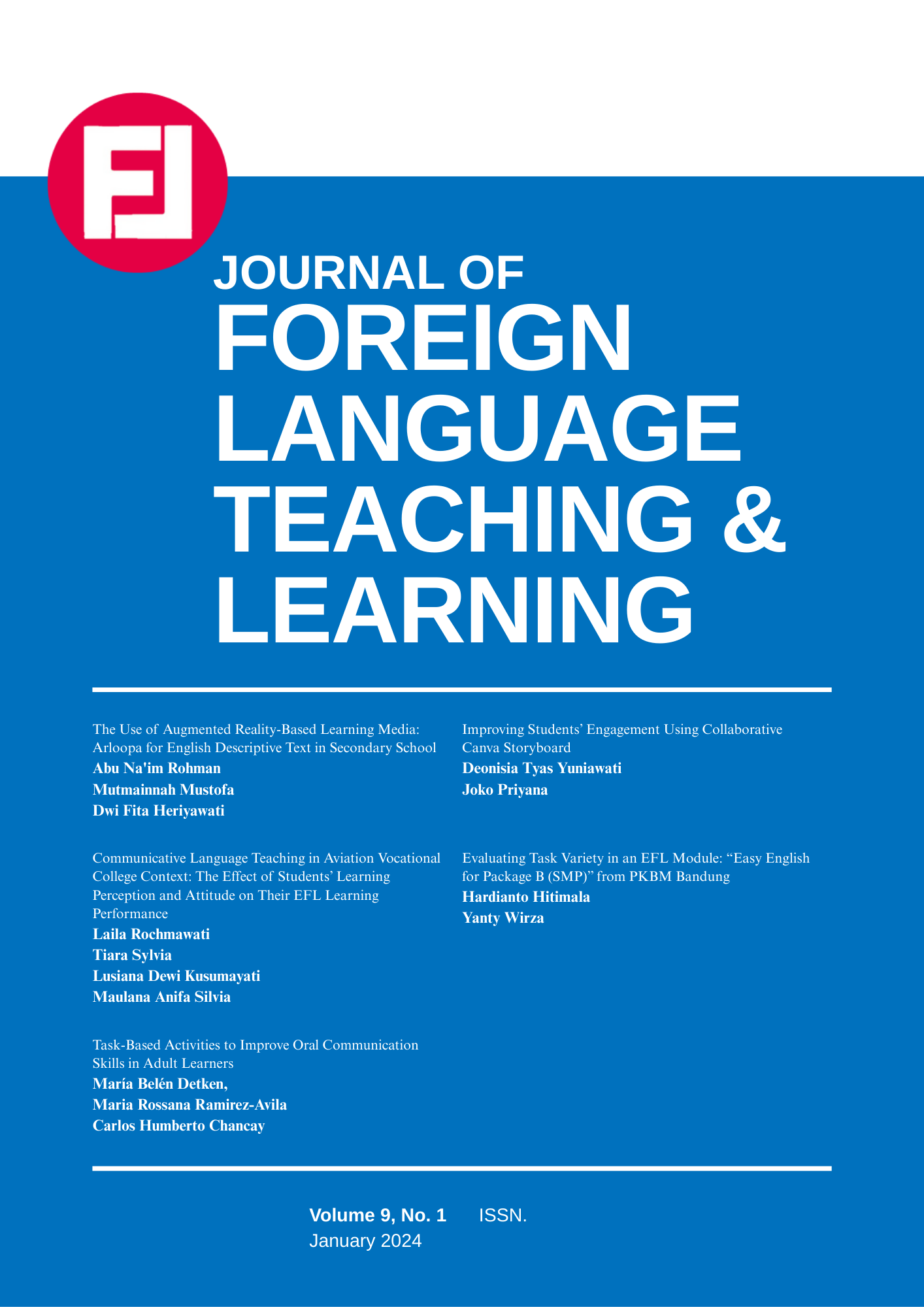Task-Based Activities to Improve Oral Communication Skills in Adult Learners
DOI:
https://doi.org/10.18196/ftl.v9i1.19381Keywords:
adult learning, EFL, interaction, speaking skills, task-based activitiesAbstract
In-service teachers in an online course had problems interacting in English. They experienced negative feelings when they had to perform orally. Thus, this action research study with qualitative and quantitative data analysis aimed to apply task-based activities to improve spoken interaction. The sample was twenty-five in-service teachers. Their level of English was A2 according to the Common European Framework of Reference. Their ages ranged between thirty and fifty. The participants were teachers from different public schools on the Coast of Ecuador. Pre and post-tests were applied to compare participants' performance from the beginning and after the intervention. Findings disclosed that the mean raised from 17.72 to 19.12, and p<0.000 is interpreted as the results are statistically significant and task-based activities improve students’ speaking performance. In-service teachers showed that as their confidence increased in their oral performance, their frustration and anxiety were reduced. Lastly, participants commented that they replicated some task-based activities in their classes. The implications of this study involve other English teachers, EFL researchers, and students who want to apply the same strategy in their teaching and learning process.
References
Álvarez, J., & Rojas, J. (2021). Motivación y aprendizaje del idioma inglés: una perspectiva conceptual [Motivation and learning of English: a conceptual perspective]. Revista Atlante: Cuadernos de Educación y Desarrollo, 13(5), 1-20. https://doi.org/10.51896/atlante/CBKK9701
Araujo, J. (2018). ¿Es diferente enseñar a adultos? Ejemplo de un curso de inglés para principiantes [Is it different to teach adults? Example of an English course for beginners]. IKASTORRATZA, e-Revista de Didáctica, 20, 46-82. http://www.ehu.es/ikastorratza/20_alea/3.pdf.
Barandica, E. (2023). Estrategias metacognitivas y pensamiento crítico en el aprendizaje del inglés: una revisión sistemática en las bases de Scopus, Dialnet y Redalyc [Metacognitive strategiess and critical thinking in the English learning: a systematic revisión in databases of Scopus, Dialnet and Redalyc]. Ciencia Latina Revista Científica Multidisciplinar, 7(2), 857-876 https://doi.org/10.37811/cl_rcm.v7i2.5371
Beltrán, M. (2017). El aprendizaje del idioma inglés como lengua extranjera [Learning English as a Foreign Language]. Revista Boletìn Redipe, 6(4), 91-98 https://doi.org/10.36260/rbr.v6i4.227
Castillo, N., Ramírez, M., & Pineda, J. (2023). De “no voy a entender nada” a “aprendí sin darme cuenta”: la experiencia vivida del aprendizaje del inglés [From “I won’t understand anything” to “I learned without realizing”: the lived experience of learning English]. IE Revista de Investigación Educativa de la REDIECH, 14, 1560. https://doi.org/10.33010/ie_rie_rediech.v14i0.1560.
Criollo-Vargas, M., Torres-Criollo, L., Lizaldes-Espinoza, O., Ramírez-Coronel, A., Sarmiento-Pesántez, M., Cordero-Zumba, N., et al. (2022). Competencias lingüísticas de los docentes de inglés en relación a los estándares de desempeño profesional en un mundo globalizado [English teachers’ linguistic competences in relation to the profesional performance standards in a global world]. Archivos Venezolanos de Farmacología y Terapéutica, 39(8), 1005-1011. https://doi.org/10.5281/zenodo.4545798.
Cuitiño, J., Díaz, C., & Otárola, J. (2019). Promoción de la fluidez y precisión oral en inglés a través del role play [Promoting fluency and accuracy in English through role play]. Cuadernos de Investigación Educativa, 10(1), 43-62. https://doi.org/10.18861/cied.2019.10.1.2880
Dahlstrom, D. (2020). Language and experience. In Ch. Engelland (Ed.), Language and phenomenology (pp. 325-330). https://doi.org/10.4324/9780429278600 .
Dávila, O., & Barrera, M. (2023). El valor de la participación en la comunicación oral en la clase de idioma inglés [The value of participation in oral communication in the English language class]. Revista Multi-Ensayos, 9(17), 50-55. https://doi.org/10.5377/multiensayos.v9i17.15741.
Poma, M. (2019). Task-based learning activities to enhance speaking skills among students in the third year of Bachillerato "a” afternoon session at Unidad Educativa del Milenio Bernardo Valdivieso of the city of Loja, 2018−2019 academic year. (Bachelor’s thesis) https://dspace.unl.edu.ec/jspui/handle/123456789/
Ding, L. (2018). Engaging in English speaking teaching based on a task-based approach: “Role-Play” with an adult Syrian in an experiential learning. The Morning Watch: Educational and Social Analysis, 46(1-2 Fall), 1–21. https://journals.library.mun.ca/index.php/mwatch/article/view/2038
Ferrando, E. (2017). Propuestas metodológicas para el diseño de un curso de lengua extranjera basado en el enfoque por tareas. Análisis de necesidades, selección y tipos de tareas [Methodological proposals for the design of a foreign language course based on the task approach. Analysis of needs, selection and types of tasks]. Trabalhos em Linguística Aplicada, 56(3), 801-837. http://dx.doi.org/10.1590/010318138649737287421.
Figueroa, R., & Intriago, J. (2022). Estrategias para la producción oral del idioma inglés en la comunicación de los estudiantes [Strategies for the oral production of the English language in student communication]. Polo del Conocimiento, 7(3), 265-292. http://dx.doi.org/10.23857/pc.v7i3.3730.
Garro, M. (2019). Análisis del uso de las cuatro habilidades lingüísticas adquiridas por las personas egresadas del programa “Fortalecimiento de la enseñanza y aprendizaje del idioma inglés en las instituciones de educación superior universitaria estatal de Costa Rica, sedes UNED” [Analysis of the usage of the four linguistic skills acquired by former students of the program “Reinforcing the teaching and learning of the English language in the institutions of the State University of Costa Rica, at UNED sites]. Revista Internacional de Educación y Aprendizaje, 7(1), 47-58 http://journals.eagora.org
Gil, N. (2019). El enfoque por tareas en la enseñanza de lenguas extranjeras: reflexiones de su origen y relación con otros enfoques [Task approach in teaching foreign languages: reflections of its origin and relationship with other approaches]. Revista Boletín Redipe, 8(9), 170-181 https://doi.org/10.36260/rbr.v8i9.820
Göktürk, Ö., Çaliskan, M., & Öztürk, M. S. (2020). The effects of creative drama activities on developing English speaking skills. Journal of Inquiry Based Activities, 10(1), 1-17. https://files.eric.ed.gov/fulltext/EJ1265727.pdf
Ha, N., Loc, N., & Tuyen, T. (2021). Task-Based approach: an overview. European Journal of English Language Teaching, 7(1), 1-10. https://doi.org/10.46827/ejel.v7i1.4090.
Hanifa, R. (2018). Factors generating anxiety when learning EFL speaking skills. Studies in English Language and Education, 5(2), 230–239. https://doi.org/10.24815/siele.v5i2.10932
Heymo, M., & Danna, A. (2019). Interacción y tareas de aprendizaje en ESP (Inglés para Propósitos Específicos) en aulas universitarias de pre-grado [Interaction and learning tasks in ESP in undergraduate classrooms]. La Revista Venezolana de Educación, 23(76), 677-686. https://www.redalyc.org/journal/356/35660459002/html/
Lessard-Clouston, M. (2018). Second language acquisition applied to English language teaching. Virginia: TESOL Press.
López, J., Paredes, A., & Ramírez-Ávila, M. (2021). EFL speaking fluency through authentic oral production. Journal of Foreign Language Teaching and Learning, 6(1), 37-55. https://doi.org/10.18196/ftl.v6i1.10175
López, J., & Velásquez, A. (2022). Experiencias pedagógicas basadas en tareas para la enseñanza-aprendizaje del inglés en Risaralda [Pedagogical experiences based on tasks for the teaching-learning of English in Risaralda]. Praxis Educación y Pedagogía, 7, 1-23 https://doi.org/10.25100/praxis_educacion.v0i7.12309.
Mejía, K., Cuásquer, S., & Arias, P. (2023). Aprendizaje basado en tareas en la enseñanza de inglés como lengua extranjera: perspectivas de los profesores [Task-Based learning in teaching English as a foreign language: teachers’ perspectives]. Revista Científica Arbitrada Multidisciplinaria PENTACIENCIAS, 5(5), 53–65. https://doi.org/10.59169/pentaciencias.v5i5.721.
Naumčiuk, T. (2023). Adult learners’ motivation to learn a foreign language. Professional Studies: Theory and Practice, 27(1), 112–119. https://doi.org/10.56131/pstp.2023.27.1.158.
Nickerson, C. (2021). Critical period in brain development and childhood learning. https://www.simplypsychology.org/critical-period.html
Nget, S., Pansri, O., & Poohongthong, C. (2020). The effect of task-based instruction in improving the English speaking skills of ninth-graders. Language Education and Acquisition Research Network Journal, 13(2), 208-224. https://files.eric.ed.gov/fulltext/EJ1258630.pdf
Pham, V., & Do, T. (2021). The impacts of task-based instruction on students’ grammatical performances in speaking and writing skills: A quasi-experimental study. International Journal of Instruction, 14(2), 969–986. https://eric.ed.gov/?id=EJ1291123
Peña, M., & Onatra, A. (2009). Promoting oral production through the task-based learning approach: A study in a public secondary school in Colombia. Profile Issues in Teachers Professional Development, 11(2), 11-26. https://www.redalyc.org/pdf/1692/169216301002.pdf
Pereddo, L. (2020). Task-based language teaching: Reducing anxiety and improving online spoken interaction. (Master’s thesis). http://dspace.casagrande.edu.ec:8080/bitstream/ucasagrande/2278/1/Tesis2453PERt.pdf
Pérez, R., Sardiñas, J., & Oliva, Y. (2022). Desarrollo de habilidades comunicativas en idioma inglés desde una concepción lingüístico-metodológica [Development of communicative abilities in English from a linguistic-methodological perspective]. EduSol, 22(80), 96-11 https://www.redalyc.org/journal/4757/475772866008/.
Quevedo, C. (2023). Factores afectivos y la producción oral en estudiantes de inglés como lengua extranjera: Alcances y limitaciones para un aprendizaje eficaz [Affective factors and the oral production of EFL students: Scope and limitations for an efficient learning]. Fronteras en Ciencias de la Educación, 2(1), 1-19. https://doi.org/10.58283/fce.v2i1.121
Ramírez-Sosa, M., & Peña-Estrada, C. (2022). B-learning para mejorar el proceso de enseñanza y aprendizaje [B-learning to improve the teaching and learning process]. Revista Docentes 2.0, 15(2), https://doi.org/10.37843/rted.v15i2.309.
Rao, P. (2019). The role of English as a global language. Research Journal of English,4(1), 65–79. https://www.rjoe.org.in/Files/vol4issue1/new/OK%20RJOE-Srinu%20sir(65-79)%20rv.pdf
Ricardo, J., Párraga, R., Acosta, Z., & Limones, J. (2023). La enseñanza de inglés como lengua extranjera en entornos virtuales a niños, jóvenes y adultos en comunidades de la provincia Santa Elena [Teaching English as a foreign language in virtual environments to children, teenagers and young adults in communities in the province of Santa Elena]. LATAM Revista Latinoamericana de Ciencias Sociales y Humanidades, 4 (5), 1447–1457. https://doi.org/10.56712/latam.v4i5.1405.
Sánchez, M. (2023). La motivación diversa como recurso didáctico en el aula de inglés (L2) [Diverse motivation as a didactic resource in the teaching of English as a second language (L2)]. CPU-e, Revista de Investigación Educativa, 37, 74-93 https://doi.org/10.25009/cpue.v0i37.2847.
Santhanasamy, C., & Yunus, M. M. (2022). A systematic review of flipped learning approach in improving speaking skills. European Journal of Educational Research, 11(1), 127–139. https://doi.org/10.12973/eu-jer.11.1.127
Downloads
Published
How to Cite
Issue
Section
License
Copyright
Authors retain copyright and grant the journal right of first publication with the work simultaneously licensed under a Creative Commons Attribution-ShareAlike 4.0 International License that allows others to share the work with an acknowledgment of initial publication in this journal.
Authors are permitted and encouraged to post their work online (e.g., in institutional repositories, social media account, or on their website) after the article getting published in the journal, as it can lead to productive exchanges and earlier and greater citation of published work (See The Effect of Open Access).License
You are free to:
- Share — copy and redistribute the material in any medium or format
- Adapt — remix, transform, and build upon the material for any purpose, even commercially.
Attribution — You must give appropriate credit, provide a link to the license, and indicate if changes were made. You may do so in any reasonable manner, but not in any way that suggests the licensor endorses you or your use.
ShareAlike — If you remix, transform, or build upon the material, you must distribute your contributions under the same license as the original.
- No additional restrictions — You may not apply legal terms or technological measures that legally restrict others from doing anything the license permits.



.png)





